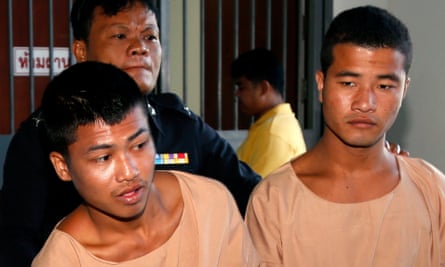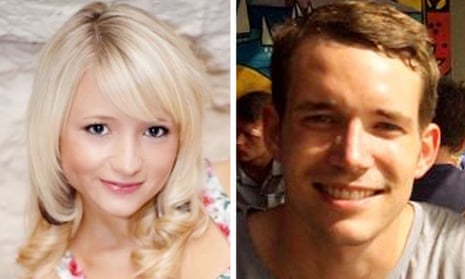The National Crime Agency in the UK has been forced to admit it acted unlawfully when it gave information to Thai police that helped send two men to death row for murdering two British backpackers.
The NCA supplied phone record evidence and intelligence to investigators in Thailand following the September 2014 murders of Hannah Witheridge, 23, and David Miller, 24, on the island of Koh Tao.
Zaw Lin and Wai Phyo, both Burmese nationals, were convicted of the murders in 2015 after a trial which the anti-death penalty group Reprieve said was unfair. They face execution by lethal injection, and claim to have been tortured.
On Tuesday, the high court in London found against the NCA – Britain’s version of the FBI – in a case brought by lawyers for Lin and Phyo.
The case is controversial because the government opposes the death penalty overseas. As a result there are tight restrictions on what help British law enforcement can provide to police abroad in cases where suspects may be put to death.
The high court order said that five times the NCA breached government rules designed to prevent UK law enforcement from inadvertently aiding human rights abuses abroad, known as overseas security and justice assistance guidance (OSJG).

Following the murders, the NCA passed Miller’s phone location data to Thai police, enabling prosecutors to say the suspects were in the same area as their alleged victim.
The NCA admitted the data-sharing was unlawful, as was the passing on of other material.
The court order also said the NCA ignored rules on seeking authority from its own directors or Home Office ministers, holding only an “informal conversation” with a British diplomat in Bangkok “about the generic death penalty risks”.
“The NCA misinterpreted the guidance … as a result of wrongly placing reliance on (a) a working understanding that the Thai authorities would make a formal request if they wanted to use information in evidence and that the question of death penalty assurances could be considered at that stage, and (b) the risk of the death penalty in fact being carried out, as distinct from the risk of it being imposed.”
The order continued: “Ministerial authorisation will be required for any assistance that might directly or significantly contribute to use of the death penalty where effective mitigation is not available unless the urgent criteria provided for in the guidance are met.”
The NCA accepted in court that it was required to consult departmental ministers.
Reprieve said the evidence and intelligence was used selectively against Lin and Phyo, and that the NCA material potentially pointed to other suspects that could have bolstered the defence case. However, this information was not given to the defence team.
Maya Foa, the director of Reprieve, said: “It is bad enough that the NCA secretly handed over evidence to help secure death sentences in a country known for unfair trials and torture. But they now admit they did this illegally, without any proper thought that their actions could contribute to a grave miscarriage of justice with two men now facing execution.
“UK cooperation with foreign police and security forces should be open and transparent. Government agencies shouldn’t have to be dragged through the courts for the public to know what is being done with their money.”
Lawyers for Lin and Phyo told the court that the data from Miller’s phone was “the only data that was used as evidence by the prosecution at [the murder] trial”.
Foreign and Commonwealth Office guidance, issued in 2016, said it was the UK’s longstanding policy to oppose the death penalty “in all circumstances as a matter of principle”.
The NCA said it was unable to comment on the case “until the court has sealed the order, which is a formality of settlement”.
